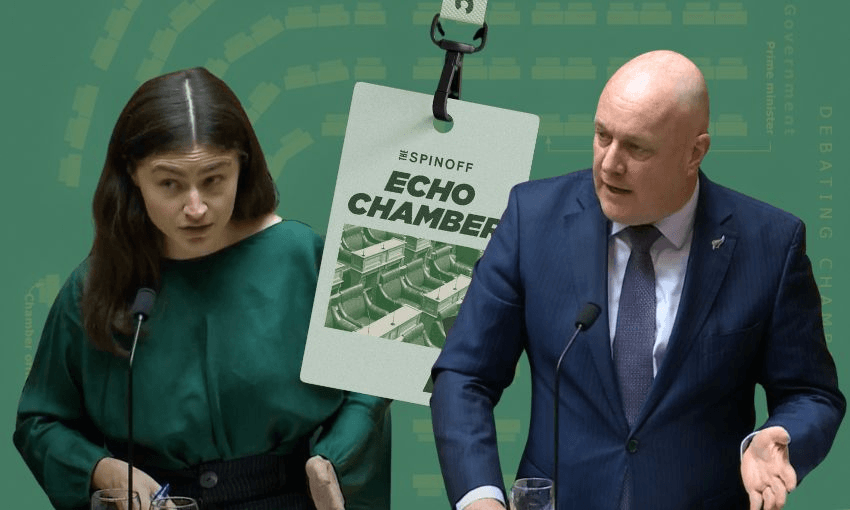Last week’s biggest story is still the government’s biggest headache.
Echo Chamber is The Spinoff’s dispatch from the press gallery, recapping sessions in the House. Columns are written by politics reporter Lyric Waiwiri-Smith and Wellington editor Joel MacManus.
The current parliamentary sitting block has been under way for only a week, but already, signs of weariness are beginning to show on the faces of our MPs. With a slew of announcements in the last seven days – a member’s bill to ban social media for under-16s (then some real government work), redress for abuse in state care survivors, a Waitangi Tribunal review, just to name a few things – and parliament sitting under urgency, patience is short, wrinkles are deep, and frowns are plentiful.
The pressure seemed to weigh deeply on the prime minister, who trotted past the opposition benches before Tuesday’s question time kicked off, stopped himself in front of Labour leader Chris Hipkins, and gave his opposition counterpart a seemingly sharp jab in the knee to get his attention. Hipkins, slumped in his seat, just shrugged and grimaced as Christopher Luxon leaned over him.
They might have been trying to figure out who the bigger liar was in the pay equity debacle, and couldn’t quite crack the case before the speaker’s entrance started proceedings. As the saying goes, there are always three sides to a story: yours, mine and the truth – or in this case, one political party, another political party, and the women of tomorrow.
Green Party co-leader Chlöe Swarbrick was first up on oral questions, in a back-and-forth with Luxon over the cutting of 33 pay equity claims in favour of a regime that will make it harder for women workers to launch new claims. Luxon, having already spent the morning fielding anti-government/pro-union propaganda, responded that, well, this new legislation simply fixed an “unaffordable” system which let librarians think that reading books all day is the same kind of boring as waiting to catch pāua poachers all day.
“And who are you compared to?” Swarbrick called across the barracking benches, before Brownlee swung his fingers and shut the orchestra up.
Then it was the “Right Honourable Christopher Hipkins”. Thank you, Mr Speaker, the Labour leader grinned, but Chris is usually fine. If it was meant to be funny, Brownlee wasn’t having it: “I wasn’t inquiring as to your health. Just ask your question.”
Another back-and-forth over pay equity with the prime minister saw Luxon keep to the “well, as I’ve said to you, we’re simply fixing your broken system” line. But Chippy remained cheerful as questions moved to finance minister Nicola Willis, who was able to laud the budget’s forecast that the government will be able to make a withdrawal from the Super Fund for the first time in 2028.
“Thanks to Labour!” Hipkins called. His squeaky little voice kept popping up, like a mouse scurrying along the floorboards: “Thank you, Labour!” And again, a little chirp – “just say thank you!”
“The leader of the opposition says, ‘thank you, Labour,’” Willis responded. “I say, ‘thank you, taxpayers’.”
Te Pāti Māori co-leader Debbie Ngarewa-Packer came in with questions about the barring of unions from the budget lockup for the first time. She pressed on despite Luxon hiding behind the finance minister, and a groan sounding from the government benches – it was Act’s David Seymour, wearing a boyish grin on his face.
“Ka pai, David? Can I carry on?” Ngarewa-Packer asked. Not leaving the attack dog politics to the minor party leader giggling in his seat, National’s number one defence, transport minister Chris Bishop, got into position. Again, the prime minister is not responsible for who attends the budget lockup, Bishop said, before piping up a few minutes later – had the prime minister perhaps seen reports of a certain political party failing to even show up to budget debates?
That set Brownlee off again, reminding the House that it was “inappropriate” to discuss the absence of another member within the House, and asking the prime minister to do so would be a breach of the standing orders. So of course, Winston Peters butted in.
Let me correct what has been said by the speaker, the NZ First leader offered. When someone talks about non-participation, they don’t mean absence – just non-participation. And then, the icing on the cake: “Words matter.”
“I’m a very, very foolish man,” Brownlee replied. “I should’ve understood that right at the start. None the less, my ruling stands.” He kept the same energy when Labour’s Kieran McAnulty rose for a point of order as soon as Luxon looked like he was ready to throw the former Labour government under the bus again: “Some people would say you’re fast, others would have a different view.”
He’s a man of great wit and little patience, that speaker. Does anyone spare a thought for Gerry Brownlee at the end of the day? It can’t be easy to deal with all these cun-… Oh wait, you can’t print that!





